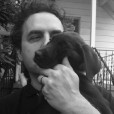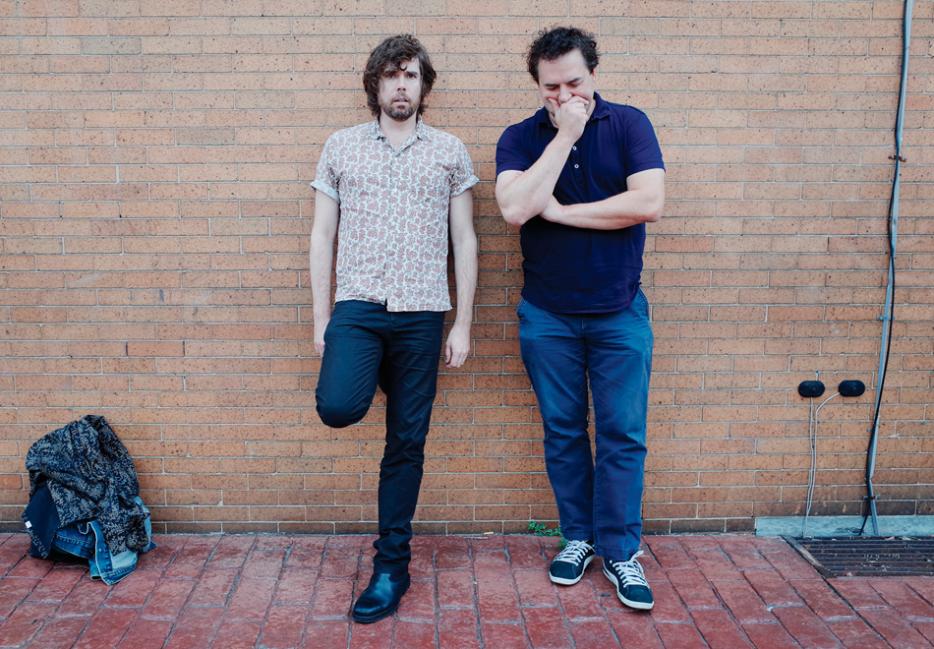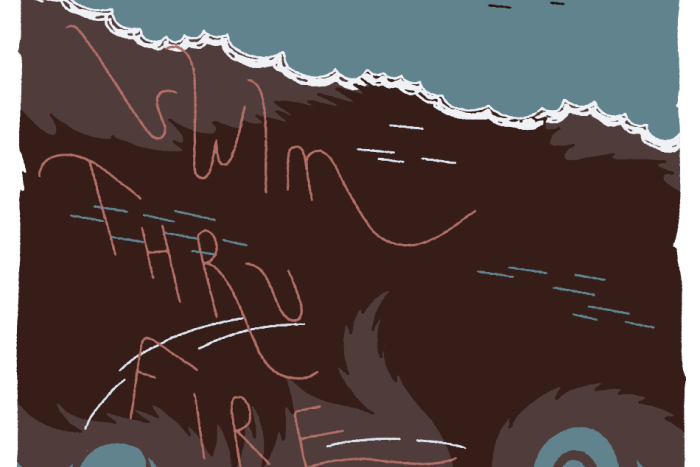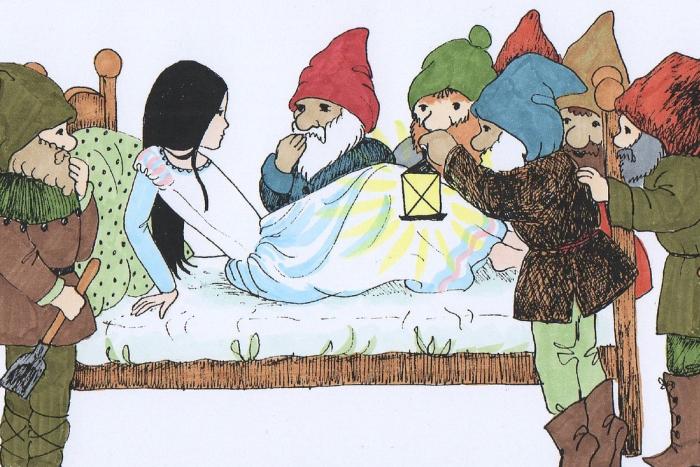The Close Read is a careful look at a component part of a thing we love—a single song, a chapter, a scene, an ingredient—often with some helpful commentary from the creators themselves. In this instalment, Bethlehem Shoals considers the greatness of Scharpling and Wurster's "Power Pop Pop Pop" call from The Best Show, annotated by Tom Scharpling.
In the fictional city of Newbridge, New Jersey, “why” is a constant refrain. When it comes from Philly Boy Roy, The Gorch, or Pat Sajak’s made-up brother, Mike—just a few of the dozens of roles played with lurid self-confidence by Jon Wurster—it’s a rhetorical challenge: “why.” The crazy world of Newbridge is the only world there is and we just have to deal.
Then there’s incredulous “why?!” from straight-man Tom Scharpling. For over a decade, Scharpling has hosted The Best Show, a three-hour program of call-ins, monologues, and music that serves as a vehicle for these bits. Scharpling, who somehow both exists as a part of Newbridge and an outside observer, is forever baffled by the tenants of the place that the two have lovingly, caustically, and tirelessly built over the last decade or so.11The concept of me being a resident of Newbridge and a resident of the “real world” during the same episode of The Best Show has always been hilarious to me and Jon. Jon in particular loves how I will be hanging up on callers with a reckless hair-trigger temper for 75 percent of the show, demanding that callers walk some impossible tightrope, but suddenly this one buffoon will call in and I will indulge literally every aspect of his arrogance or stupidity for the next 35 minutes without any chance of him being hung up on.
Scharpling can’t believe what he’s hearing. Is Timmy Von Trimble really a two-inch-tall White Supremacist? Is that a dog or a person talking? At the same time, Wurster’s characters are so matter-of-fact in their absurdity that they’re taken aback by Tom’s skepticism.22Is there really any doubt that I believe that Timmy Von Trimble is two inches tall? The way I see every single call is that yes, I am incredulous at their claims but I do accept it and move forward with the reality that is being presented to me over the phone. I would hate to think that people aren’t sure—once I express an initial bout of shock—if I think I am being pranked or that it’s not real. If I don’t believe it’s real I will question the caller and then it will fall apart by design.
With every call, Scharpling and Wurster will Newbridge—its denizens, its lore, its geography, and even its relevance to real-life figures such as Bruce Springsteen—into existence. That tenacity is also why we have The Best of the Best Show, a mammoth box that collects 16 CDs worth of Wurster calls into Scharpling’s The Best Show (formerly a radio show on WFMU, now its own digital entity). The lavish package is as towering and detail-oriented as the material, an undertaking that treats Scharpling and Wurster’s years of work with the utmost seriousness while retaining their all-important sense of mischief and instability. Scharpling and Wurster aren’t just a brand of humor unto themselves or jokesters who invented a place out of thin air. Their output is a fractured, scurrilous, uproarious, cynical, and in its own way, unflinchingly honest picture of life in pop-culture-addled, sub-city America.33But who is the cynical one? I don’t know if either of us are. Are we? I might be disappointed in someone’s low motivations, but I think I’m more like Charlie Brown in this regard, constantly bummed that someone is operating from a terrible place, but then I go get the football again next week.
Newbridge may be absurd as all get-out, but as opposed to the play-acting of Garrison Keillor, it feels lived-in and abundant. This is what it means to build a world that, however far out it may venture, never fails to peek into our own.
It’s nearly impossible to pick one quintessential call. Do you go with a pillar of the community like Roy, whose allegiance to the City of Brotherly Love borders on fanaticism? How about “Big Bill and Little Bill,” where a father, son, and dog with identical voices bicker with each other and Scharpling? Maybe it’s the saga of the aforementioned and reprehensible Mike Sajak, or “G.G. Land,”44I think it’s actually “Planet G.G.”? Although G.G. Land sounds strangely more sinister than Planet G.G.
the crown jewel of Scharpling and Wurster’s long-running fascination with scuzz-punk auteur G.G. Allin? At some point, it’s a matter of personal taste. But, if pressed, I’d go with “Power Pop Pop Pop” from May 22, 2007.55This is probably one of my top three favorite calls. It is self-contained, covers a lot of ground, has Jon doing some of his best list comedy, and builds to the dumbest and easiest play on words—“Power Pop Pop Pop”—that somehow doesn’t feel cheap and was sitting there on the table for anyone to take for the last thirty-plus years.
It starts simply enough: a nameless caller wants to request a song. Before Scharpling gets a chance to explain that he’s done playing music for the night, the caller rattles off a string of bands that may or may not be real. Music is key to Scharpling and Wurster’s humor, as they draw little distinction drawn between big names like Bruce Springsteen, fringe types like Allin, and made-up artists like Denny Leonard and the Lemons or The Zoom.66My favorite from the list is “Larry Neville and the Fun.” And this is what I was referencing previously; “list comedy” is when Jon will just go on an endless tear of names, listing a bunch of bands or celebrities or whatever. He is the master at this. And for this call he wrote that list out solo; I was hearing the names for the first time on air.
They poke fun at snobbery by blurring the line between obscurity and bullshit.
What this guy really wants is to promote Popstrastrophe 2007, an annual festival. “Power Pop Pop Pop” is an extended riff on a sub-genre of lean, propulsive rock that skews bright—but no one’s in a rush to explain this. As usual, Tom, who is somehow both himself and a resident of Newbridge, gamely plays along. He knows, and we know he knows, but the last thing any of us wants is for him to break the spell of lunacy.77I would never break the spell of lunacy! You can trust me on that! What gain is there for me to ever break ANY spell of lunacy, in or out of a Jon call? Unless some random caller’s idea of “lunacy” happens to be my idea of “unfunny,” it will never happen!
These bits build and grow; they draw you in gradually, sometimes never really resolving themselves. The denizens of Newbridge are so convinced that what they have to say matters that Scharpling (and the listeners) are forced to humor them. There’s something admirable about that level of self-delusion.
Scharpling isn’t just there to listen. He anchors and reorganizes things to keep the listeners (and Wurster) from falling off the deep end. Tom gives us his opinion on power pop and, in the process, sheds some light on what the hell they’re actually talking about. Scharpling points out that too much power pop gets repetitive, which is when our caller drops the bomb: “What if Quad P heard you?” Quad P, he explains, is short for Power Pop Pop Pop, “the number one power pop guy in America. He considers himself the President of power pop.”88Again, how was this dopey pun still available for comedic purposes? I generally hate puns, unless they are so incredibly dumb that they loop around to where they are funny again. Which might be the point of all puns? Which might mean I don’t hate puns, I just hate bad puns?
Power Pop Pop Pop may not be the most important Scharpling-Wurster character, or even the funniest, but few have been as markedly bizarre. The caller explains that Power Pop Pop Pop rides around town in a sidecar and thus can only go down hills (“He’s got an entire lifestyle based around only being able to go downhill”), and when you enter his house, the Power Pop Palace, you have to put on Beatle boots—he even keeps a size 14.5 around, in case “any pro ballers show up.”99I love the NBA so much and Jon could not care less about sports. It’s always funny to me how my mind starts to race with the possibility of doing all sorts of dumb NBA jokes when Jon floats something like that. But that would be boring to everybody except for a handful of dummies. So no Anthony Bonner jokes on the show, sorry!
He wrote a 1,200-page oral history of the Flamin’ Groovies’ “Shake Some Action.” He derides “drug music” and considers even much of Big Star—probably the best known of any power pop act—too far-out. For Power Pop Pop Pop, all but a handful of Big Star songs are “art rock.”1010Power Pop Pop Pop has to be one of the characters that has drawn the highest amount of people coming up to me and/or Jon and saying, “I know who you modeled that character on!” And they all guess this one guy. And they’re wrong. We were actually spurred on by a guy who used to post on a music industry message board called VelvetRope.com in the early 2000s. The board was loaded with people who were certain they knew what “real” music was, and for a handful of posters, this meant power pop. There was a guy—I’m pretty safe in assuming it was a guy—who used to call himself something like “Quest4BetterPop,” and he would be so resistant to anything that didn’t fit his definition of power pop. So that’s where it started.

But there’s a dark side here. Despite the silliness of Newbridge, it’s also a haven for schemers, outsiders, and perverts. There’s the constant threat of aggression; calls very often end with someone threatening to assault or murder Scharpling, or themselves being killed off; there was even a long-running thread about laser-whipping, which was as silly as it was brutal.1111There was also a stretch where characters would pass out because they used a (fictional) drug called “blue” during the call. And they would often call back up five minutes later, still asleep.
Then there’s the casual skeeziness of many Newbridgites; one of Wurster’s signatures is a skin-crawling use of the word “erotic.” We’re being asked to laugh at the absolute worst aspects of humanity—lechery, corruption, incompetence, murder, and exploitation—while admitting that this repulsion is all too familiar.
As it turns out, Power Pop Pop Pop is a “power pop dictator” known around town as “Pol Pop.”1212More puns! I guess we do like puns!
He uses his vast wealth to enforce ridiculously strict guidelines for “textbook power pop.” He’s prone to violence, especially using “the popper,” a small handgun shaped like a Rickenbacker bass that fires hard rocks of “concentrated garbage.”1313Jon and I have fit some reference to a “garbage cannon” into a few different things. One of the weirder places was in a screenplay that we were hired to write for an actual major studio. Someone got hit by a garbage cannon. The movie did not get made.
There’s a special popper for women, which Scharpling refuses to hear about. The Power Pop Palace has a sex dungeon called “The Lair.” Oh, and for good measure, the call touches on the scene’s reluctant love for The Resistance—purveyors of “White Power pop.”1414And there it is. The ultimate pun.
But the crux of the call, the reason we’re laughing even as we recoil, is when Scharpling finally cracks, reminding us that “this music is all about falling in love and having a good time and enjoying your life!” We are hearing about a monster and sadist against a backdrop of harmony vocals and jangly guitars. The contrast between darkness and light is almost as ridiculous as the caller’s nonchalance about it. Newbridge is at once sinister and goofy because, however obliviously, Wurster’s characters take all things in stride. To some degree, we all do, as we spend much of our lives trying to assimilate bad, bad things, whether in the news around us or in our own very real experiences. We do so with cynicism, repression, and other ways of downplaying just how rotten the world is.1515Some people say I’m a negative person. I truly disagree with that. I think I’m an extremely positive person who is always disappointed when people are less than they can or should be. Does that still mean I’m a negative person?
Scharpling and Wurster drag debauchery, corruption, stupidity, and general creepiness out into the light and, well, make light of it. It’s high-level satire; queasy subject matter is the kind of cosmic joke that’s both devastating and laughable.
For all of the earnestness of Newbridge’s denizens and the shock value of these calls, large-scale irony might be Scharpling and Wurster’s greatest strength. If Newbridge is made believable, there’s also a distinct possibility that everything these callers say is a lie; they’re so clearly marked as ridiculous people with all sorts of ulterior motives that expecting them to tell the truth is a stretch.1616As the person who co-wrote and co-performed the call, I never once doubted that this caller was telling the truth. This isn’t Lake Wobegon; this shit is HAPPENING! But we are fascinated by people who delude themselves and are the last to know that they’re not fooling anyone, and we work it into the calls as much as possible. But this really isn’t one of those calls.
In “Power Pop Pop Pop,” the caller admits he’s had a few glasses of wine, deliberately calling into question just how reliable a narrator he is, compounding the fact that we’re hearing all this information second-hand from a guy who, right from the jump, has established himself as an unreasonable power pop fanatic. For all we know, he’s merely spreading rumors about Power Pop Pop Pop, or—as is revealed in a later installment—pushing his own agenda.1717He’s not spreading rumors! It’s real! Or as real as our non-real stuff is real!
What makes “Power Pop Pop Pop” such a riveting listen is that mix of micro and macro, of outlying riffs and a strong arc. There are colorful nods to other Newbridge characters, like the debauched Judge Montgomery Davies or rogue cop Officer Harrups. Yet as this whole saga unfolds over 40 minutes, Power Pop Pop Pop himself changes, going from laughable to pitiable and then from unsettling to reprehensible. Just when the call plateaus, there’s another twist that compounds the lunacy. As sprawling as Scharpling and Wurster’s humor can be at times, there’s always a highly calculated structure at play.1818The calculated structure comes out of how much of the calls are written ahead of time. Often there are scripts for the calls that map out literally every beat for us both; Jon will write it out and send me a copy and we will perform it. Other times we can play it looser and have reference points that we need to hit. In the case of this call, I can’t find the script but I would bet that since it was a first-time character that it was much more scripted.
Wurster’s characters never waver or doubt their own existence; Scharpling, too, is willing to go along for the ride even he wishes he could turn away. There’s always Newbridge. And at the end of each call, it always feels like home.







